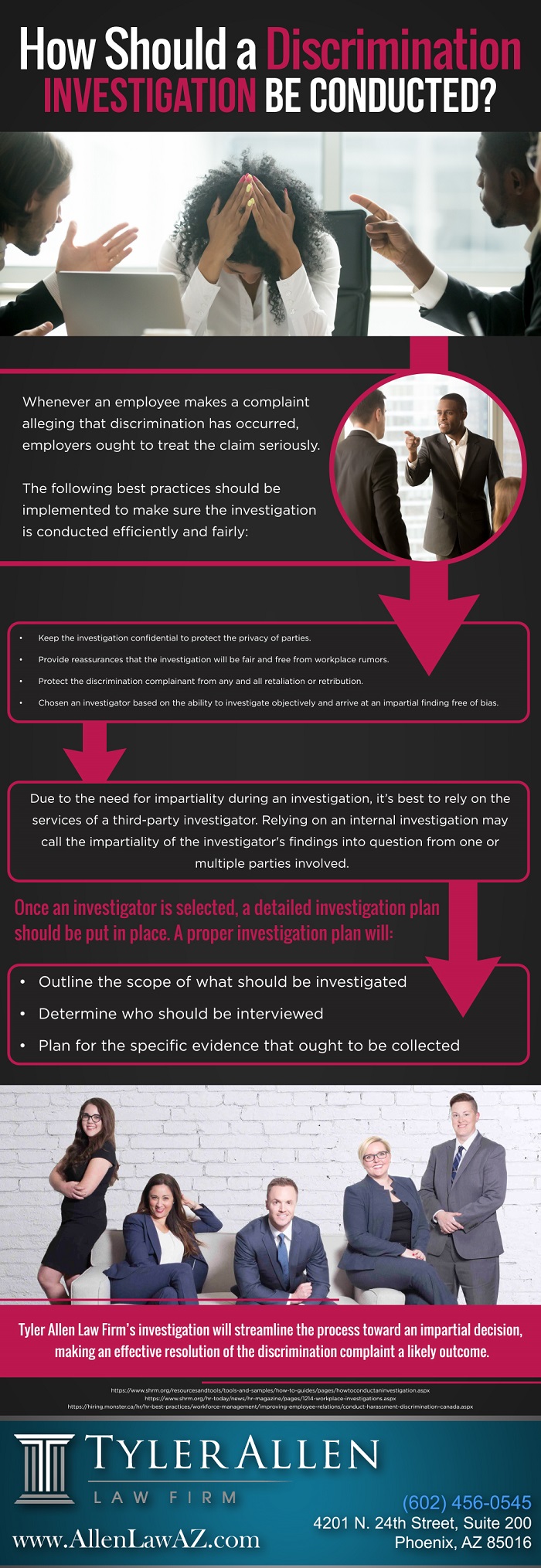Discrimination
Tyler Allen Law Firm represents people who have been treated differently at work because of their race, gender, age, religion, disability or national origin. We handle Equal Employment Opportunity Commission (EEOC) claims as well as violations of state and federal law. Discrimination is the unjust or prejudicial treatment of different categories of people. We have found that discrimination in the state of Arizona usually falls into one of the categories below

How Should a Discrimination Investigation Be Conducted
Age
Sexual orientation
Race
Gender/sex
Religion
National origin
Disability
It is illegal to discriminate and/or retaliate. If you feel you’ve been discriminated and/or retaliated against, you may have a right to compensation under the law. Contact an employment attorney at Tyler Allen Law firm to discuss the details of your case.
Blog Articles | Discrimination
Our expert criminal defense team at Tyler Allen Law Firm has over 30 years combined experience defending clients charged with sex crimes. We have compiled that vast array of knowledge into several informative blog articles to answer many frequently asked questions from those charged with these crimes.
Laws Against gender discrimination in the workplace
Steps to take if you’ve been discriminated against
LGBT WORKPLACE DISCRIMINATION
RETALIATION
MORE…
Contact us to discuss the details of your case by filling out the form on this page or calling us at (602) 456-0545
Additional Blog Articles | Tyler Allen Law Firm
Probate has a reputation problem. For many Arizona families, the word alone triggers anxiety, frustration, or avoidance. Unfortunately, much of what people believe about probate is either incomplete or flat-out wrong. Those misunderstandings often lead families to delay planning, make poor decisions under stress, or assume problems will “sort themselves out” after a death. In reality, probate myths frequently cost families time, money, and control when they can least afford it.
The start of a new year is one of the few moments when people naturally pause and take stock of their lives. For Arizona families, that pause often includes finances, insurance, taxes, and long-term planning. What tends to get overlooked is estate planning, especially when documents already exist. Many people assume that once their estate plan is signed, it is “done.” In reality, estate planning documents are only as effective as their accuracy, coordination, and alignment with current law and family circumstances.
Most people think their estate plan is “finished” the moment they sign their documents. They sit through the signing meeting, feel relieved that everything is finally in writing, take their binder home, and assume the job is done. But the truth is that the documents themselves are only half the work. The step that actually determines whether the plan functions the way it’s supposed to is the one most people ignore: getting the assets aligned with the plan.
Every year, Arizona homeowners settle into the holiday season thinking about lights, inflatables, and a little extra cheer — and every year, someone is surprised by an HOA notice on their door. It almost always catches people off guard. The decorations feel harmless. Nothing about the holiday spirit seems like it should trigger a rule violation. But HOAs regulate exterior appearance more closely than most people realize, and the holidays are when those rules collide most often with everyday life.
The end of the year is when Arizona businesses finally slow down long enough to look closely at their workplace practices, and it’s also when employees start paying attention to how they were treated over the past twelve months. December has a way of exposing everything people ignored during the rest of the year — outdated policies, missing training, pay issues, and disputes that never quite got resolved. Whether you run a business or work for one, year-end changes in employment law matter because they determine what rights and obligations both sides walk into January with.
The holidays have a way of bringing families together and reminding us what truly matters. Between the travel, the meals, and the conversations that stretch late into the evening, it is also a time when many people think about the bigger picture. This is when questions about the future tend to surface. Who will make decisions if I cannot? Are my wishes written down somewhere? Have I made things as easy as possible for my family?
When someone decides to buy an existing company in Arizona, one of the first legal questions that comes up is how the deal will be structured. There are two main options: an asset purchase or a business purchase. They sound similar, but they work very differently and carry very different risks.
Choosing a trustee is one of the most important decisions you will make when creating a trust. A trustee is the person or institution you appoint to manage the assets in your trust and to carry out your instructions when you can no longer do so. The role is a serious one. The trustee has a legal duty to act in the best interest of your beneficiaries, to manage trust property responsibly, and to follow the terms you have written.
As the year winds down, Arizona business owners are busy wrapping up projects, closing out books, and trying to get a few quiet days before the holidays. It’s easy to focus on what’s in front of you, like client work, payroll, and planning for the next quarter. Before the calendar turns, it’s worth taking a moment to make sure your business is actually in good standing with the Arizona Corporation Commission.
As the year winds down, many Arizona employees are preparing for annual performance reviews. These meetings can shape your pay, promotions, and even job security. While your employer may frame the review as a casual check-in, it’s also a formal record that can affect your future. Here’s how to approach it with both professionalism and legal awareness.
For more information about your legal rights or to discuss the facts of your legal claim, contact Tyler Allen Law Firm, PLLC for a legal consultation.











